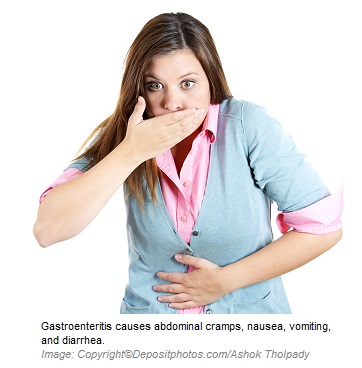 stomach or small intestine or both. In general, it starts suddenly, is characterized by anorexia, nausea, vomiting, borborygmi (rumbling sounds of the abdomen), abdominal cramps, and diarrhea (with or without blood and mucus), and is self-limited and resolves by itself within 2 to 5 days. It may be associated with fever, headache, fatigue, and muscle pain. Bloody diarrhea is usually seen in bacterial gastroenteritis rather than viral.
stomach or small intestine or both. In general, it starts suddenly, is characterized by anorexia, nausea, vomiting, borborygmi (rumbling sounds of the abdomen), abdominal cramps, and diarrhea (with or without blood and mucus), and is self-limited and resolves by itself within 2 to 5 days. It may be associated with fever, headache, fatigue, and muscle pain. Bloody diarrhea is usually seen in bacterial gastroenteritis rather than viral.
Known also as acute infectious gastroenteritis, it may be acquired foodborne, waterborne, or via person-to-person spread.
Stomach Flu is the term used by public to describe viral gastroenteritis.
Food Poisoning is gastroenteritis caused by consuming contaminated foods or water, and they are bacterial or parasitic.
Traveler`s Diarrhea is a type of acute infectious gastroenteritis caused by Escherichia Coli.
Potential causative agents and contributing factors:
- Viruses (most common):
- Rotavirus (in children).
- Norovirus (in adults, and associated with cruise ships).
- Bacteria:
- Campylobacter (more common):
- Salmonella.
- Shigella.
- Escherichia Coli (the cause of Traveler`s Diarrhea).
- Staphylococcus aureus.
- Clostridium difficile.
- Parasites: Giardia, and Cryptosporidium.
- Food allergies: nuts, dairy products, eggs, and shellfish.
- Dysbiosis (imbalance between good bacteria and bad bacteria) due to consumption of antibiotics.
- Heavy metal toxicity: mercury, aluminum, lead and arsenic.
- Contaminated foods or water.
- Compromised immune system:
- AIDS.
- Transplant recipients.
- Chemotherapy.
Nutritional Supports:
Restricted Foods and Dietary Advices:
- Fats and oils.
- Greasy foods.
- Fried foods.
- Processed foods.
- Sweets and sugars: bacteria feed on sugar.
- Allergenic foods.
- Dairy products.
- Eggs.
- Shellfish.
- Alcohol.
- Caffeine.
- Ice cream.
- Cola-containing beverages.
- Gluten – containing foods.
- Fructose (in quantities surpassing the GI ability to absorb): Apple juice, pear juice, grapes, honey, dates, figs, and flavored soft drinks.
- For Traveler`s Diarrhea:
- Avoid eating foods or drinking beverages purchased from street vendors or other establishments with poor hygienic conditions.
- Avoid eating raw or undercooked meats and seafood.
- Avoid having raw fruits and vegetables unless the traveler peels them.
Recommended Foods:
- Water: fresh and preferably filtered, 2 – 3 liters a day. Dehydration could be very dangerous in people with gastroenteritis.
- Soups and broths.
- Cooked fruits and vegetables.
- Diluted fruit juices.
- Whole grains (gluten free).
- Rice.
- Potato.
- Banana.
- Pasta.
- Fruits high in pectin: apricots, pears, apples, guavas, quince, plums, gooseberries, and citrus fruits.
- Vegetables high in pectin: carrots, and potatoes.
- Foods high in tannins: blueberries, loganberry, chockberry, cranberry, grapes, persimmon, pomegranate, quince, strawberries, avocado, eggplant, and parsnip. Tannins have astringent, antibacterial, and anti-diarrheal activities.
- Ginger.
- Garlic: it contains allicin and ajoene. They are sulfur-containing phytochemicals and natural antibiotics that have antibacterial, antiviral, antifungal, and anti-inflammatory properties.
- Lemon juice diluted in a glass of water.
- Chamomile tea.
- Peppermint tea.
Recommended Supplements:
- Probiotics: a product with 5 – 10 billion organisms per serving. Probiotics are especially effective in preventing traveler`s diarrhea by inhibiting adherence of the causative bacteria to the intestinal wall.
- Carbo Powder: 20 – 30 grams a day. Known also as Locust Bean Gum, carbo powder is derived from the seeds of carbo tree and contains tannins that have astringent effect and are useful in diarrhea.
- Berberine: 500 – 1000 mg a day. It is an alkaloid found in plants such as barberry, goldenseal, Oregon grape, tree turmeric, and goldthread. Berberine helps with infectious diarrhea.
- Ginger: as a tea, one cup every 2 – 3 hours, or as a capsule, 500 – 1500 mg a day. The active ingredients in ginger are volatile oils, zingiberene, bisabolene, shogoals, and gingerols. Ginger aids digestion, reduces irritation to the intestinal walls, and has anti-vomiting and anti-nausea activities.
- Oregano Oil (containing over 50% carvacrol): as a capsule, 1000 – 2000 mg a day, or as a liquid, 0.5 ml three times daily or as instructed on the label.
- French Maritime Pine Bark Extract: 200 – 300 mg a day. It is a powerful anti-inflammatory flavonoid.
- Grape Seed Extract: 100 – 200 mg a day.
- Glutamine: 3000 – 5000 mg a day. Glutamine is a restorative amino acid that is used by the GI tract for fuel and repair.
- Bismuth Subsalicylate: 500 – 1000 mg every 6 hours. Bismuth has anti-bacterial and anti-diarrheal activities against traveler`s diarrhea. Caution:Bismuth subsalicylate is for preventive purpose only in Traveler`s Diarrhea, and not in any other infectious gastroenteritis. It should not be taken by people who are pregnant or allergic to aspirin and by people taking anticoagulants, probenecid, or methotrexate.

